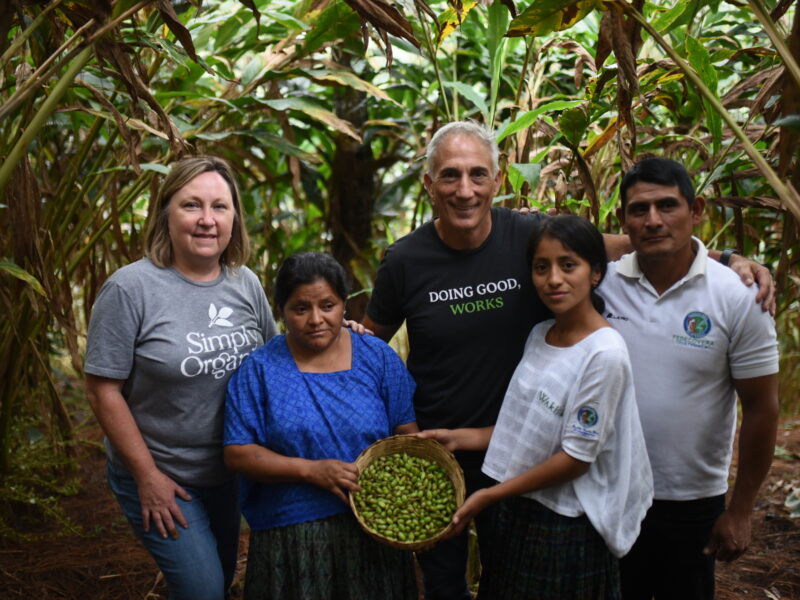As we celebrate Earth Day and reflect on our impact on the planet, it’s essential to consider the choices we make in our daily lives. One of the most effective choices we can make is to opt for organic products. Organic agriculture isn’t just about what we put into our bodies, it’s also about the positive impact it has on the environment.
Earth Day is a powerful reminder of the importance of protecting our planet and preserving its natural resources for future generations. By choosing products that are sustainably sourced, responsibly produced, and environmentally friendly, we can reduce our carbon footprint, minimize waste, and support companies that prioritize the well-being of the planet.
Here are five ways organic is better for the planet.
- Soil health: Organic farming practices make soil health the priority, employing crop rotation, cover cropping, and composting to nourish the soil naturally. By avoiding synthetic pesticides and fertilizers, organic farmers protect soil biodiversity, promote nutrient cycling, and prevent soil erosion, ensuring the land’s long-term health and fertility.
- Water conservation: Conventional agriculture relies heavily on irrigation and chemical inputs, leading to water pollution and depletion of freshwater resources. In contrast, organic farming practices focus on water conservation, using techniques such as drip irrigation, mulching, and water-efficient crop selection to minimize water usage and preserve precious water resources.
- Biodiversity preservation: Organic farms provide a haven for biodiversity, supporting many plant and animal species that contribute to ecosystem health and resilience. By avoiding synthetic pesticides and genetically modified organisms (GMOs), organic agriculture protects pollinators, birds, and other wildlife, fostering biodiversity and ecological balance.
- Climate change mitigation: Organic farming has the potential to mitigate climate change by reducing greenhouse gas emissions and sequestering carbon in the soil. By avoiding synthetic fertilizers and promoting organic matter accumulation in the soil, organic agriculture helps capture and store carbon, easing the effects of climate change and enhancing the resilience of agricultural systems to extreme weather events.
- Reduced chemical exposure: Choosing organic products reduces our exposure to harmful chemicals, benefiting not only our own health but also the health of the environment. By avoiding synthetic pesticides and fertilizers, organic agriculture minimizes chemical runoff into waterways, reduces air and soil pollution, and protects wildlife and ecosystems from the negative impacts of toxic chemicals.
This Earth Day, let’s commit to shopping with intention, making eco-friendly choices that not only benefit the environment but also empower us to live more consciously and sustainably every day. We recommend using our list of organic brands to inform your next shopping trip along with our seasonal shopping guides.
As we strive to build a more sustainable and resilient future, the environmental benefits of going organic cannot be overstated. By supporting local organic agriculture, we can protect soil health, conserve water resources, preserve biodiversity, mitigate climate change, and reduce chemical exposure—all while enjoying nutritious and delicious food. This Earth Day let’s commit to making more deliberate choices that benefit both our planet and future generations.
If you want to take a deeper dive into organic here are several blogs that highlight our commitment to educating consumers about climate change and organic solutions.
If you’d like some outside sources, we highly recommend these reputable allies that provide valuable information on the science behind choosing organic and its benefits to the environment:
- The Organic Center: The Organic Center is your trusted source on the science of organic food and farming. TOC serves up unbiased research so you can make healthier choices based on scientific findings. They are forever curious and in pursuit of the truth.
- Environmental Working Group (EWG): EWG is a nonprofit that researches environmental issues, including pesticide use in agriculture, among other things. Their website offers resources and guides about choosing organic foods to reduce exposure to pesticides and support environmental sustainability.
- Rodale Institute: The Rodale Institute is a leading research institution dedicated to organic farming and regenerative agriculture. Their website offers a wealth of resources, including research studies, articles, and reports, that highlight the environmental benefits of organic farming practices.
- Organic Farming Research Foundation: The Organic Farming Research Foundation is a nonprofit that conducts research and promotes organic farming practices. Their website features research reports, fact sheets, and articles that delve into the environmental advantages of organic agriculture.
- United States Department of Agriculture: The USDA provides information on organic farming regulations, standards, and certification processes. Their website includes resources on organic agriculture and its environmental benefits, as well as data and statistics on organic production in the United States.
- National Organic Program (NOP): The NOP is a regulatory program within the USDA that oversees the certification and labeling of organic agricultural products. Their website provides information on organic standards, certification requirements, and the benefits of organic farming practices.
- Friends of The Earth: Friends of The Earth is a nonprofit organization that supports developing sustainable food systems that decrease our reliance on carbon-intensive factory farming and harmful pesticides that have decimated bee and butterfly populations.
- Beyond Pesticides: Beyond Pesticides is a nonprofit organization that works with allies to protect public health and the environment to lead the transition to a world free of toxic pesticides.
Join us in celebrating Earth Day by choosing organic and supporting a healthier, more sustainable world for all. Together, we can make a difference – one organic choice at a time.
Happy Earth Day from Only Organic!









